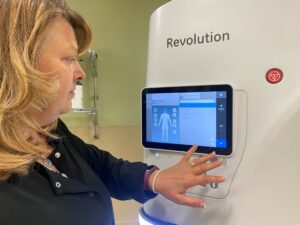The radiology department at Manning Regional Healthcare Center recently upgraded their CT scanner to the state-of-the-art GE Revolution Maxima. The previous CT scanner was installed in 2010 at the former hospital location and brought to the new facility in 2014. 
“With the acceleration of technology and the advancement of AI software, our old scanner quickly became outdated making the need for a new CT scanner a top priority,” said Director of Radiology, Linda Croghan, RT (R) (M)(CT)(ARRT). “Upgrading to a new model scanner allows for high resolution imaging, lower radiation exposure, more weight capacity and smart technology to account for specific patient anatomy.”
Previously, some patients had to be referred to other locations to receive CT services due to the aging technology. “With this new machine we have not had to refer anyone to other facilities in order to receive higher-quality scans,” said Croghan.
The new system also improves patient position accuracy and simplifies the entire patient set-up process by providing one-click, hands-free detection and automation.
The new scanner also reduces noise, decreases patient breath hold times, reduces time in the scanner, accelerates exam time from start to finish, reduces patient dose, and decreases contrast quantity. It improves the exam quality on patients where hardware (such as joint replacement) is present with metal artifact reduction software.
One of the unique features the CT scanner offers is the ability to the demonstrate the scan process to those who speak a different language or young children who may not understand directions or what is being asked, making the process more convenient for all who use the services.
“With this new scanner, we are able to deliver more personalized and comfortable care due to hands-free operation,” Croghan said. “Our plan is that once we become fully staffed we will begin to offer early detection cancer screenings.”
MRHC is offering a $10,000 sign-on bonus for a radiology technologist to start immediately. The qualified candidate will have a permit to practice radiography in the state of Iowa, be a graduate of an AMA-approved radiologic technology program, and have a current certification as a radiographer ARRT-R. To learn more about this position visit www.mrhcia.com/careers.
